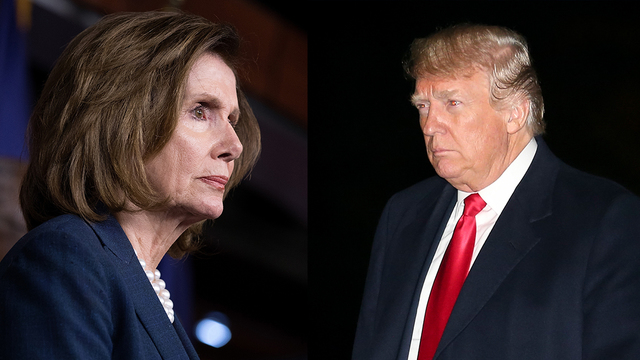www.aljazeerah.info
Opinion Editorials, January 2019
Archives
Mission & Name
Conflict Terminology
Editorials
Gaza Holocaust
Gulf War
Isdood
Islam
News
News Photos
Opinion Editorials
US Foreign Policy (Dr. El-Najjar's Articles)
www.aljazeerah.info
2019 Will Experience Greater US Domestic Conflicts Over Issues that Intersect Between Trade and Military Wars By James Petras Al-Jazeerah, CCUN, January 4, 2019 |
 |
 |
|
| Nancy Pelosi and Donald Trump |
The New Year Past and Future
Introduction
They year 2018 ended with bitter partisan conflicts over narrow
issues. Over
seventy percent of the federal budget was approved by
both parties and another twenty
nine percent was delayed because of a
conflict over ‘border security’ involving
expenditures of less than
one hundredth of one percent.
Multiple wars, coups, sanctions and trade disputes dominated the US
political
agenda. War budgets grew, military sales
increased and frictions between the US and
Saudi Arabia bubbled to
the surface . . . and dissipated.
We will proceed to provide a realistic assessment of the US in world
politics
during the past year, as a prelude to what we can expect in
the coming year – 2019.
US policy followed along the lines of
previous presidents and military advisers:
pursuing wars in Syria, Afghanistan, Iraq, Yemen and Somalia; adding
military bases in
Eastern Europe and the Baltics; promoting economic
sanction against Iran, Russia, China
and North Korea and adding
minor ones against traditional allies in Europe and East
Asia.
These measures did not radically alter trade relations even as
divergences
emerged between the President and his senior cabinet
Generals, several of whom
resigned.
Resignations and
dismissals in the executive branch reflected the division over
President Trump’s military withdrawals from Syria and Afghanistan, his
efforts to lower
military costs and losses in regions of no profit
or progress. Trump’s opponents objected
to his long-term commitments
and efforts to finance economic spending and growth at
home and
abroad.
The Democratic Party pushed hard to increase or at least maintain a
military
presence and commitments and to engage in symbolic hostile
gesture against Russia
(Russophobia) and North Korea.
Shadow boxing highlighted internal partisan disagreements over
immigration.
Trump promised a border wall, the Democrats a fence.
Both followed the same
restrictive immigration policies and expelled
millions of Central Americans and
Mexicans, as did their
predecessors.
Domestic policy, especially the major reduction of taxes for the very
rich, was
wholeheartedly backed by both parties .Despite their
political propaganda divergences
the Democrats voted for the rich
and denounced the Republicans. The Republicans took
credit for the
tax ‘reform’ and credited it for ‘economic growth”.
Both parties and branches of government called for billion-dollar
infrastructures
funding and nothing was done. Both engaged in
partisan ‘conflicts’ over healthcare and
educational reforms but
nothing was done.
The respectable press blamed President Trump
for avoiding wars, colluding with
Russia and threatening the global
free-market economy, without recognizing the
collaboration of the
Democrats who engaged in their own version of global warfare.
In real
terms, the two parties followed parallel policies at home and abroad,
while
engaging in harsh rhetorical combat.
The key issue was the intense partisan warfare over which party could
gain
control of the seats of power, patronage and ‘rents’ from
financial and real estate
transactions.
Stock markets rose and fell but inequalities deepened, and debt
multiplied, and the
markets increasingly depended on state
billion-dollar subsidies from national, regional
and local
governments.
The Year 2019: Continuities and Ruptures
Economic strategies and policies will be at the forefront throughout
2019. For the
business elite the central issue in dispute will be the
so-called ‘trade war’, which
President Trump and his economic
advisers are pursuing against China.
If the Trump administration secures concessions from President Xi
Jinping, it will
be confined to financial openings for US investors
and a greater role for US exports. The
US will push a greater role
for the Chinese private sector willing to share markets rather
than
State sector growth.
If the US demands wholesale dismantling of
China’s state direction and
regulation of the economy then a trade
war is inevitable. The results will disconnect the
entire global
economy and disrupt US business linkages.
The stock market will plunge, markets will become more volatile and
the top 500
multi-nationals will disinvest and suffer deep losses
which will ripple throughout the
business sector.
The US is counting on several allies of dubious reliability. A sector
of the
Chinese neo-liberal academic elite is leading the charge to
marginalize the role of the
state, reduce regulations and limit
China’s large scale overseas projects.
While influential in some
policy sectors, the pro-US academics have yet to dictate
policy to
the Chinese Communist Party leaders.
The US has attempted to create an anti-China alliance, with Asian and
EU
countries. The problem is that the US protectionist trade policy
is equally prejudicial to
these would-be trade allies.
Without influential allies in and out of China, the US may attempt to
deepen its
domestic market and/or turn to increasing its military
presence encircling China. The
problem, however, is that Washington
under Trump is turning away from military
intervention in the Middle
East and South Asia and has turned toward a ‘business first’
agenda.
In any case the key to the advance or decline of the US economy
in 2019 depends
on the outcome of the trade war with China.
The second problematical area in 2019 is the political war between
and within the
Pentagon and President Trump’s security operatives.
Trump’s business priorities and rapid-fire ousting of Generals
promoting losing
and costly wars – in Afghanistan, Syria and
elsewhere – has provoked a formidable
hostile coalition of Democrats
controlling Congress, the majority of the Pentagon and
their
military allies in the mass media.
If Trump is able to shift from ‘military’ to ‘economic’ imperialism
he will be able
to rebuild his domestic support and to finance
popular multi-billion-dollar infrastructure
projects.
If Trump succumbs to the military metaphysics which is promoted by
the liberal-
neo-conservative-Zionist coalition and falls prey to
Middle East wars, Russophobia and
China/North Korea war- baiting,
the Trump business first coalition will divide and
collapse.
The domestic economy is likely to end its growth and stagnate unless
Trump can
convince the business elite to invest in the domestic
economy, including higher wages
and social spending. A dubious
proposition!
If Trump relies on the ‘invisible hand’ of the
market his domestic protectionist
market strategy will fail to
sustain growth, regardless of the Federal Reserves monetary
policy.
Conclusion
The Year 2019 will experience greater domestic conflicts over
issues that
intersect between trade and military wars. The
Party disputes will deepen and paralyze
policy making .The inability
to fashion bi-partisan economic alliances will continue, but
party
warfare will not prevent any changes in military and social budgets. If
the
Democrats sieze the initiative and impose their military
agenda, we will witness the
prolongation of regional wars
and economic stagnation.
If Trump triumphs in imposing his economic agenda and reaches a
strategic trade
agreement with China, the economy will continue to
grow but at a snail’s pace as the tax
handout stimulus will not raise
investments as profits are pocketed.
In sum, 2019 will be a year of great uncertainties in which the
divisions between
parties,over markets and militarism will
deepen,and prevent any decisive shift in strategic
policies. Only a
dramatic removal from power of the key political actors in both parties
will shift the balance of power between the protagonists of multiple
wars and their
opposition in popular movements.
***
Share the link of this article with your facebook friends
|
|
|
|
||
|
||||||


